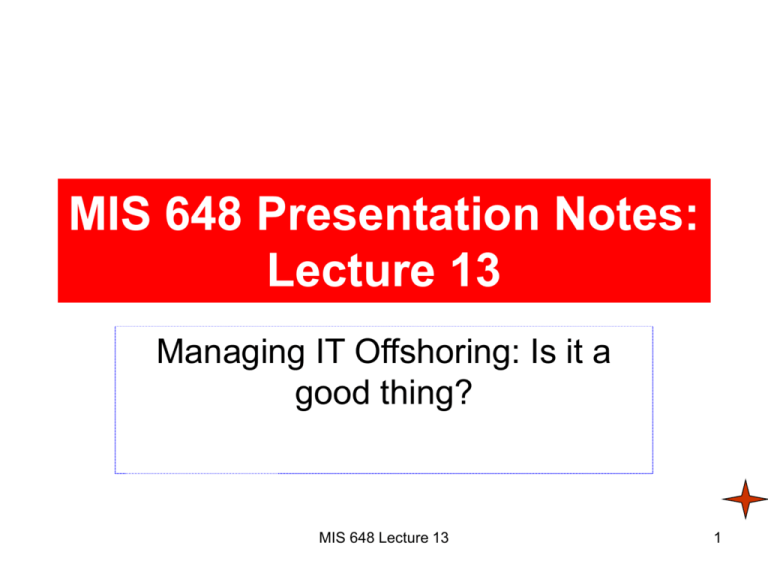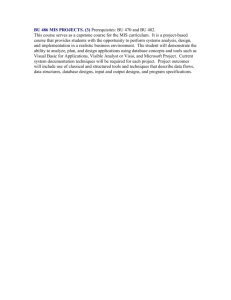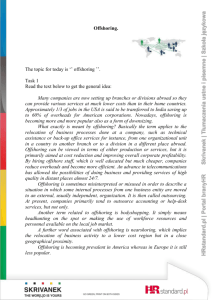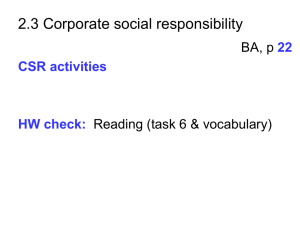MIS 648 Presentation Notes: Lecture 13
advertisement

MIS 648 Presentation Notes: Lecture 13 Managing IT Offshoring: Is it a good thing? MIS 648 Lecture 13 1 AGENDA Introduction to the lecture Goals of the Lecture Outsourcing: Definition and Context Offshoring: Definition and Context Business Models of IT Offshoring (Khan & Fitzgerald) Managing the relationship (Oza & Hall) Economic Challenges MIS 648 Lecture 13 2 Goals of the Lecture Understand the distinctions among outsourcing, insourcing and offshoring Develop a critical view of outsourcing and offshoring as solutions to business challenges Evaluate offshoring in an economic context Develop aids to outsourcing and offshoring decisions to lower risk MIS 648 Lecture 13 3 The Structure of the Issue Managing IT Outsourcing IT Outsourcing Implementation Issues Outsourcing General issues Strategic Management MIS 648 Lecture 13 4 Outsourcing Defined A partnership between one firm (client) and another (vendor) for the vendor to perform services for the client according to a predefined contract. Services may include any aspect of the client firm value chain or support services. Support services are the most likely target for outsourcing Nothing new here. MIS 648 Lecture 13 5 Variations on Outsourcing “Insourcing” = Internal departments compete among themselves or with outside vendors for contract “Offshoring” = a form of outsourcing where vendors are located in another country MIS 648 Lecture 13 6 Aspects of Outsourcing Determining the services to be outsourced Selecting the vendor Negotiating the terms of the contract Managing the contract on both sides Evaluating the contract delivery MIS 648 Lecture 13 7 Advantages of Outsourcing Economies of scale Sticking to the knitting Latest technology, skills, knowledge Lowered costs Less investment in hardware, people MIS 648 Lecture 13 8 Outsourcing IT Services IT services are simply another form of support services for the firm Do you agree? What makes IT service outsourcing complex and challenging: Type of service (technical, technological) Type of people Type of product (intangible, “unseen”) Let’s make it more challenging by going global! MIS 648 Lecture 13 9 Type of Service Data center operation Website design, hosting, operation Communication services System development (analysis, design, implementation, maintenance) IT planning Remember this list. MIS 648 Lecture 13 10 Offshoring Defined Outsourcing to another country Historically offshoring has involved a few notable vendor countries: IS Development: India Specialized software: Israel IT Services: Ireland In essence, offshoring is an extension of the Maquiadora idea. A “spot” of production in one country aimed entirely for export to another, except in real time A negative MIS 648 Lecture 13 11 Advantages of Offshoring Historically the advantages of offshoring have been almost completely economic Savings can run up to 90% or more Recently thanks to the Internet and technological advances, other advantages are appearing, such as development of markets, increased innovativeness, etc. Business for IT and IT-enabled offshoring services MIS 648 Lecture 13 12 Challenges of Offshoring Strategic impact (“size”?) Technological uncertainty (“gap”) Functional complexity Procedural knowledge/uncertainty (“stability”) Asset specificity Culture differences Interdependency MIS 648 Lecture 13 13 Models of Outsourcing Khan and Fitzgerald (2005) studied four British firms’ offshoring experience They developed a four-dimensional model of the outsourcing decision These are descriptive dimensions rather than predictive ones (i.e., they help us describe what happens rather than predict what will happen MIS 648 Lecture 13 14 Khan and Fitzgerald Model These factors influence offshoring decisions and shape the resulting relationship Organizational Who initiates SWOT issues Who implements Potential for reengineering Technological Org’l capabilities Key requirements & usage Support & maintenance Environmental Domestic vs. overseas Resources & Expertise Standard quality Ability to network Trade law; political stability Culture Market entry advantage Process Offshoring Decision Culture MIS 648 Lecture 13 Requirements Project management Contract Trust & security Communication Standard quality 15 Culture IS important, it turns out CMM level 4 or 5 (/5) Concerns on the vendor side Oza and Hall studied 18 high maturity Indian software companies They wanted to know what difficulties do the vendors experience They used interviewing and grounded theory A qualitative method in which the ideas “emerge” from the comments of theMIS interviewers rather than from a 648 Lecture 13 predefined theory of the researchers 16 Difficulties Concerns on the vendor side Oza and Hall studied 18 High Maturity Indian software companies They wanted to know what difficulties do the vendors experience MIS 648 Lecture 13 17 Full List of Concerns Cultural Issues Expectation management Language Loss of control Loss of jobs at client company Transition Lack of client’s experience Distance/access Getting maturity Loss of business knowledge by client Time zones Lack of domain knowledge MIS 648 Lecture 13 18 The Broader View Offshoring means the exportation of jobs Offshoring carries all the downside of outsourcing, perhaps magnified Offshoring is a natural outcome of the assumptions of capitalism; but it does put strain on the jobs system, forcing home country workers to increase their skill levels and to employ increasing levels of capital-intensive technology. MIS 648 Lecture 13 19





